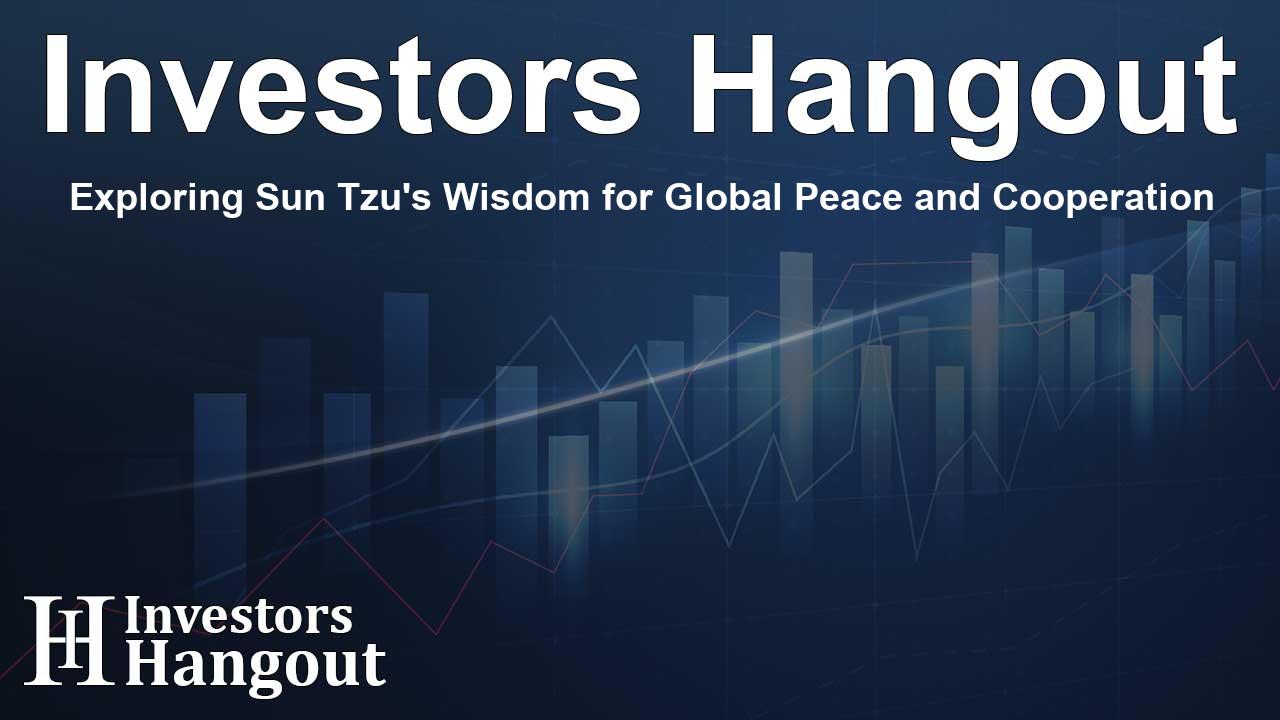Exploring Sun Tzu's Wisdom for Global Peace and Cooperation

Understanding the Legacy of Sun Tzu
Sun Tzu, a revered strategist from ancient China, crafted profound teachings that transcend time. His seminal work, The Art of War, is not just a military manual; it provides timeless insights into the dynamics of conflict and peace. Today, these principles are increasingly relevant as nations navigate complex geopolitical landscapes.
The Global Security Initiative: A Modern Framework for Peace
Recently, an important document called the Global Security Initiative (GSI) Concept Paper was released, garnering international attention. This initiative, presented by Chinese leadership, aims to foster a collective spirit among nations to sidestep conflicts and uphold global stability. It resonates with the wisdom of Sun Tzu, particularly the emphasis on careful consideration before engaging in warfare.
Commitments of the GSI
At the heart of the GSI are six core commitments: promoting comprehensive security, respecting sovereignty, upholding the principles of the UN Charter, addressing legitimate security concerns, resolving disputes through dialogue, and maintaining security across various domains. These commitments reflect a forward-thinking diplomatic approach that prioritizes humanity’s shared future.
Gathering of Global Minds: The Symposium
A recent symposium in a major city brought together over 350 delegates from nearly 30 countries. They convened to reflect on the enduring relevance of Sun Tzu’s teachings. Focusing on the art of conflict resolution through mutual understanding and cultural exchange, the event served as a platform for sharing ideas and strategies that align with the modern challenges of our world.
Exploring Themes of Peace and Conflict Prevention
During the two-day event, participants examined themes from The Art of War, discussing its implications in today’s era of artificial intelligence and international relations. They affirmed that Sun Tzu's philosophy often revolves around the concept of avoiding war altogether, highlighting the significance of dialogue and negotiation.
The Wisdom of Avoiding War
One of the key insights attendees highlighted was the notion that war should be an absolute last resort. A prominent academic at the symposium quoted, "A sovereign must not launch a war out of anger, nor must a general fight a war out of resentment." This profound understanding underlines the dire consequences of conflict and reinforces the call for dialogue as a tool for peace.
China’s Role in Future Peacebuilding
Experts voiced that China is evolving into a global leader in soft power, advocating a new diplomacy that emphasizes cooperation among nations. This aligns with the GSI’s objectives, as emphasized by several participants. This approach promotes development, particularly in regions where the risk of conflict looms large.
Addressing Modern Security Threats
The GSI emphasizes that traditional and non-traditional security threats are increasingly intertwined. Its principles advocate for a collaborative approach to global governance that involves consultation, shared contributions, and mutual benefits. Tackling issues like terrorism and climate change requires a united front, reflecting Sun Tzu’s call for cooperation even between adversaries.
Conclusion: A Call for Global Unity
Ultimately, the GSI represents a hopeful stride toward a future where nations prioritize peace over aggression. By embodying the spirit of The Art of War, both historical and contemporary discourses urge nations to reinforce strategic communication and foster an environment conducive to peace. The world needs these teachings now more than ever to navigate through the tumultuous challenges we face today.
Frequently Asked Questions
1. What is the Global Security Initiative?
The Global Security Initiative (GSI) is a framework proposed by Chinese leadership aimed at fostering peace, cooperation, and dialogue among nations to mitigate conflicts.
2. How does Sun Tzu's work relate to modern diplomacy?
Sun Tzu’s teachings emphasize strategic thinking and the importance of avoiding conflict, which is vital in contemporary diplomatic relations and peacebuilding efforts.
3. What are the six commitments of the GSI?
The six commitments involve promoting comprehensive security, respecting sovereignty, upholding the UN Charter, addressing security concerns, resolving disputes through dialogue, and maintaining diverse security measures.
4. Why is the symposium significant?
The symposium gathered insights from global experts, fostering dialogue on the relevance of ancient strategies in addressing modern conflicts and emphasizing mutual learning.
5. How can the principles of Sun Tzu inform current global challenges?
Sun Tzu's principles advocate for careful deliberation before conflict, promoting peace and cooperation as effective solutions to global challenges, including wars and shifting alliances.
About The Author
Contact Evelyn Baker privately here. Or send an email with ATTN: Evelyn Baker as the subject to contact@investorshangout.com.
About Investors Hangout
Investors Hangout is a leading online stock forum for financial discussion and learning, offering a wide range of free tools and resources. It draws in traders of all levels, who exchange market knowledge, investigate trading tactics, and keep an eye on industry developments in real time. Featuring financial articles, stock message boards, quotes, charts, company profiles, and live news updates. Through cooperative learning and a wealth of informational resources, it helps users from novices creating their first portfolios to experts honing their techniques. Join Investors Hangout today: https://investorshangout.com/
The content of this article is based on factual, publicly available information and does not represent legal, financial, or investment advice. Investors Hangout does not offer financial advice, and the author is not a licensed financial advisor. Consult a qualified advisor before making any financial or investment decisions based on this article. This article should not be considered advice to purchase, sell, or hold any securities or other investments. If any of the material provided here is inaccurate, please contact us for corrections.
